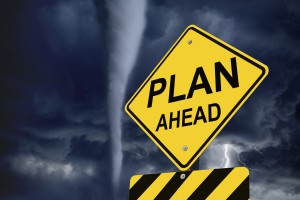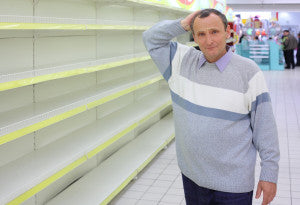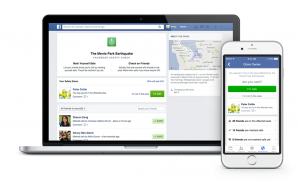When do you start thinking about disaster planning?

Although we don’t need to
dwell on thoughts of disaster every moment of every day (what kind of life would that be, anyway?), we should still keep them in mind throughout the year. I know, I know, but you don’t even want to be thinking about major snowstorms in the middle of the summer, tornadoes in January, job loss working at your sweet job, or earthquakes in…wherever and whenever! And why not? Probably because it’s not snow storm season in the summer (unless you're in Canada...) and tornado season starts in the spring, not January, so you’re just not thinking about it. But here, come in a little closer to your monitor and I’ll let you in on a little secret:
that’s what they want you to think. The longer you put it off, the easier it is for those disasters to come at you without warning.
Diabolical, if you ask me.
But, believe it or not, there is a way to counter these evil schemes. It’s called planning. It’s what you do before road trips, mapping out your college career, and yes, even before a crisis or disaster happens. There’s no sense in waiting until you see the twister on approach or you get that pink slip from your boss, because by then, it’s too late.

There are a number of different areas in which you should keep in mind for disaster planning. Food, water, and shelter have been discussed ad nauseam on this blog, however those are still some of the most crucial areas in preparation. I think we all understand the need to prepare for disasters. If an earthquake or tornado or flood comes strolling through town, it can not only ruin your home, but local grocery stores, farms, and other places that provide you with food. You might not have running water, so you’d need some sort of backup. And if your house gets washed away or crumbles to the ground (or is just far too unstable to trust during the night), you’re going to want some sort of shelter for you and your family.
Losing a job can be just as devastating. Although your home is still intact and your faucets work, you no longer have an income and still have four mouths to feed (or five, or six…). Having an emergency food storage will not only help you financially (because investing in food is a real thing), but will help bring you at least some peace of mind knowing your family is still being fed during the interim of Replaceing a new job.
But of course, you know
why you should plan. But now the question is
what should you plan. Although each individual and family is different and has their own individual needs, there are still some basics for planning that you should keep in mind. Ready.gov has, as usual, some great ideas for how and what to plan.
You may want to start with a
family emergency communications plan. This should include things such as everyone knowing where to meet following a disaster if your home is evacuated, out-of-town emergency contacts, school and work contacts, and medical contacts. Make sure your kids have your phone numbers memorized, and remember: if it’s not an emergency, text; don’t call. Text messages may have an easier time getting through and won’t tie up phone lines that emergency workers will need.
Use technology to help communicate with loved ones that you’re OK. The internet is the third most popular way for Americans to get their information regarding a disaster and let their friends and loved ones know they’re safe.

A personal example of this comes from the Nepal Earthquake. The morning it happened, I woke up with an alert on my phone that a huge quake had hit Nepal. It sounded bad, and I hoped it just sounded worse than it was. Then, I remembered one of my good friends was over in Nepal doing humanitarian work. I immediately went to Facebook to see if there was any news from him. Well, there was. Facebook was on it, and the
Facebook Safety Check alert popped up on my screen right after I logged in. It said I had one friend in the affected area, and he was marked as safe. Then I found a status update of his. As it turns out, he was in the airport, just about to leave Nepal when the earthquake struck. He and his group were fine – just temporarily delayed. I learned all that from Facebook, and then I stopped worrying about him.
So you see, Facebook can be a great way of making sure your friends and family know you’re alright. Of course, Facebook is just one way to go about it. Replace a way to make the Internet work for you.
Next on the list is knowing where your utility shut-offs are. According to ready.gov, “natural gas leaks and explosions are responsible for a significant number of fires following disasters.” Shutting off your utilities after a disaster can really save your home – and your lives. Replace the shut-off valves for your natural gas, water, and electricity, so if there is a concern, you’ll know where to go.

Financial preparedness is something we don’t always think about, but should still plan for. Have some extra cash stashed somewhere in your house (preferably in bills no larger than $20), because there’s always the possibility that credit and debit machines won’t work. Also plan to have adequate insurance for your home, car, and belongings. Along with this, have your important documents and records in an easily accessible location. Doing all this will help you recover faster from disaster.
Lastly, plan ahead to be prepared with safety skills. First aid and CPR classes can provide the knowledge and skills you need to help save and protect those close to you. By receiving official certification from the American Red Cross, you’ll even be
protected when you give aid to others. Without that protection (as sad as it is to say), you could face lawsuit, so make sure you plan ahead so when the time comes to help, you won’t be afraid to.
Well, I hope this gives you a good starting place for planning ahead for disaster. Of course, there are many other areas to plan for, such as shelter, heat, and sanitation. But this should get you started. Check out our other blog posts to learn more about preparing for disasters.
Additional Reading:
How Good Sanitation Can Save Your Life:
/blog/18189/good-sanitation-can-save-your-life/
4 Reasons Why You Need an Emergency Shelter:
/blog/18157/why-you-need-an-emergency-shelter/
How Emergency Food Storage Can See You Through Unemployment:
/blog/18089/emergency-food-storage-can-see-unemployment/
 Although we don’t need to dwell on thoughts of disaster every moment of every day (what kind of life would that be, anyway?), we should still keep them in mind throughout the year. I know, I know, but you don’t even want to be thinking about major snowstorms in the middle of the summer, tornadoes in January, job loss working at your sweet job, or earthquakes in…wherever and whenever! And why not? Probably because it’s not snow storm season in the summer (unless you're in Canada...) and tornado season starts in the spring, not January, so you’re just not thinking about it. But here, come in a little closer to your monitor and I’ll let you in on a little secret: that’s what they want you to think. The longer you put it off, the easier it is for those disasters to come at you without warning.
Diabolical, if you ask me.
But, believe it or not, there is a way to counter these evil schemes. It’s called planning. It’s what you do before road trips, mapping out your college career, and yes, even before a crisis or disaster happens. There’s no sense in waiting until you see the twister on approach or you get that pink slip from your boss, because by then, it’s too late.
Although we don’t need to dwell on thoughts of disaster every moment of every day (what kind of life would that be, anyway?), we should still keep them in mind throughout the year. I know, I know, but you don’t even want to be thinking about major snowstorms in the middle of the summer, tornadoes in January, job loss working at your sweet job, or earthquakes in…wherever and whenever! And why not? Probably because it’s not snow storm season in the summer (unless you're in Canada...) and tornado season starts in the spring, not January, so you’re just not thinking about it. But here, come in a little closer to your monitor and I’ll let you in on a little secret: that’s what they want you to think. The longer you put it off, the easier it is for those disasters to come at you without warning.
Diabolical, if you ask me.
But, believe it or not, there is a way to counter these evil schemes. It’s called planning. It’s what you do before road trips, mapping out your college career, and yes, even before a crisis or disaster happens. There’s no sense in waiting until you see the twister on approach or you get that pink slip from your boss, because by then, it’s too late.
 There are a number of different areas in which you should keep in mind for disaster planning. Food, water, and shelter have been discussed ad nauseam on this blog, however those are still some of the most crucial areas in preparation. I think we all understand the need to prepare for disasters. If an earthquake or tornado or flood comes strolling through town, it can not only ruin your home, but local grocery stores, farms, and other places that provide you with food. You might not have running water, so you’d need some sort of backup. And if your house gets washed away or crumbles to the ground (or is just far too unstable to trust during the night), you’re going to want some sort of shelter for you and your family.
Losing a job can be just as devastating. Although your home is still intact and your faucets work, you no longer have an income and still have four mouths to feed (or five, or six…). Having an emergency food storage will not only help you financially (because investing in food is a real thing), but will help bring you at least some peace of mind knowing your family is still being fed during the interim of Replaceing a new job.
But of course, you know why you should plan. But now the question is what should you plan. Although each individual and family is different and has their own individual needs, there are still some basics for planning that you should keep in mind. Ready.gov has, as usual, some great ideas for how and what to plan.
You may want to start with a family emergency communications plan. This should include things such as everyone knowing where to meet following a disaster if your home is evacuated, out-of-town emergency contacts, school and work contacts, and medical contacts. Make sure your kids have your phone numbers memorized, and remember: if it’s not an emergency, text; don’t call. Text messages may have an easier time getting through and won’t tie up phone lines that emergency workers will need.
Use technology to help communicate with loved ones that you’re OK. The internet is the third most popular way for Americans to get their information regarding a disaster and let their friends and loved ones know they’re safe.
There are a number of different areas in which you should keep in mind for disaster planning. Food, water, and shelter have been discussed ad nauseam on this blog, however those are still some of the most crucial areas in preparation. I think we all understand the need to prepare for disasters. If an earthquake or tornado or flood comes strolling through town, it can not only ruin your home, but local grocery stores, farms, and other places that provide you with food. You might not have running water, so you’d need some sort of backup. And if your house gets washed away or crumbles to the ground (or is just far too unstable to trust during the night), you’re going to want some sort of shelter for you and your family.
Losing a job can be just as devastating. Although your home is still intact and your faucets work, you no longer have an income and still have four mouths to feed (or five, or six…). Having an emergency food storage will not only help you financially (because investing in food is a real thing), but will help bring you at least some peace of mind knowing your family is still being fed during the interim of Replaceing a new job.
But of course, you know why you should plan. But now the question is what should you plan. Although each individual and family is different and has their own individual needs, there are still some basics for planning that you should keep in mind. Ready.gov has, as usual, some great ideas for how and what to plan.
You may want to start with a family emergency communications plan. This should include things such as everyone knowing where to meet following a disaster if your home is evacuated, out-of-town emergency contacts, school and work contacts, and medical contacts. Make sure your kids have your phone numbers memorized, and remember: if it’s not an emergency, text; don’t call. Text messages may have an easier time getting through and won’t tie up phone lines that emergency workers will need.
Use technology to help communicate with loved ones that you’re OK. The internet is the third most popular way for Americans to get their information regarding a disaster and let their friends and loved ones know they’re safe.
 A personal example of this comes from the Nepal Earthquake. The morning it happened, I woke up with an alert on my phone that a huge quake had hit Nepal. It sounded bad, and I hoped it just sounded worse than it was. Then, I remembered one of my good friends was over in Nepal doing humanitarian work. I immediately went to Facebook to see if there was any news from him. Well, there was. Facebook was on it, and the Facebook Safety Check alert popped up on my screen right after I logged in. It said I had one friend in the affected area, and he was marked as safe. Then I found a status update of his. As it turns out, he was in the airport, just about to leave Nepal when the earthquake struck. He and his group were fine – just temporarily delayed. I learned all that from Facebook, and then I stopped worrying about him.
So you see, Facebook can be a great way of making sure your friends and family know you’re alright. Of course, Facebook is just one way to go about it. Replace a way to make the Internet work for you.
Next on the list is knowing where your utility shut-offs are. According to ready.gov, “natural gas leaks and explosions are responsible for a significant number of fires following disasters.” Shutting off your utilities after a disaster can really save your home – and your lives. Replace the shut-off valves for your natural gas, water, and electricity, so if there is a concern, you’ll know where to go.
A personal example of this comes from the Nepal Earthquake. The morning it happened, I woke up with an alert on my phone that a huge quake had hit Nepal. It sounded bad, and I hoped it just sounded worse than it was. Then, I remembered one of my good friends was over in Nepal doing humanitarian work. I immediately went to Facebook to see if there was any news from him. Well, there was. Facebook was on it, and the Facebook Safety Check alert popped up on my screen right after I logged in. It said I had one friend in the affected area, and he was marked as safe. Then I found a status update of his. As it turns out, he was in the airport, just about to leave Nepal when the earthquake struck. He and his group were fine – just temporarily delayed. I learned all that from Facebook, and then I stopped worrying about him.
So you see, Facebook can be a great way of making sure your friends and family know you’re alright. Of course, Facebook is just one way to go about it. Replace a way to make the Internet work for you.
Next on the list is knowing where your utility shut-offs are. According to ready.gov, “natural gas leaks and explosions are responsible for a significant number of fires following disasters.” Shutting off your utilities after a disaster can really save your home – and your lives. Replace the shut-off valves for your natural gas, water, and electricity, so if there is a concern, you’ll know where to go.
 Financial preparedness is something we don’t always think about, but should still plan for. Have some extra cash stashed somewhere in your house (preferably in bills no larger than $20), because there’s always the possibility that credit and debit machines won’t work. Also plan to have adequate insurance for your home, car, and belongings. Along with this, have your important documents and records in an easily accessible location. Doing all this will help you recover faster from disaster.
Lastly, plan ahead to be prepared with safety skills. First aid and CPR classes can provide the knowledge and skills you need to help save and protect those close to you. By receiving official certification from the American Red Cross, you’ll even be protected when you give aid to others. Without that protection (as sad as it is to say), you could face lawsuit, so make sure you plan ahead so when the time comes to help, you won’t be afraid to.
Well, I hope this gives you a good starting place for planning ahead for disaster. Of course, there are many other areas to plan for, such as shelter, heat, and sanitation. But this should get you started. Check out our other blog posts to learn more about preparing for disasters.
Additional Reading:
How Good Sanitation Can Save Your Life: /blog/18189/good-sanitation-can-save-your-life/
4 Reasons Why You Need an Emergency Shelter: /blog/18157/why-you-need-an-emergency-shelter/
How Emergency Food Storage Can See You Through Unemployment: /blog/18089/emergency-food-storage-can-see-unemployment/
Financial preparedness is something we don’t always think about, but should still plan for. Have some extra cash stashed somewhere in your house (preferably in bills no larger than $20), because there’s always the possibility that credit and debit machines won’t work. Also plan to have adequate insurance for your home, car, and belongings. Along with this, have your important documents and records in an easily accessible location. Doing all this will help you recover faster from disaster.
Lastly, plan ahead to be prepared with safety skills. First aid and CPR classes can provide the knowledge and skills you need to help save and protect those close to you. By receiving official certification from the American Red Cross, you’ll even be protected when you give aid to others. Without that protection (as sad as it is to say), you could face lawsuit, so make sure you plan ahead so when the time comes to help, you won’t be afraid to.
Well, I hope this gives you a good starting place for planning ahead for disaster. Of course, there are many other areas to plan for, such as shelter, heat, and sanitation. But this should get you started. Check out our other blog posts to learn more about preparing for disasters.
Additional Reading:
How Good Sanitation Can Save Your Life: /blog/18189/good-sanitation-can-save-your-life/
4 Reasons Why You Need an Emergency Shelter: /blog/18157/why-you-need-an-emergency-shelter/
How Emergency Food Storage Can See You Through Unemployment: /blog/18089/emergency-food-storage-can-see-unemployment/


2 comments
Sandy
I was just told after 20 years working for the same company that the doors are closing. I’m so glad I’m prepared with enough food and preps to last over a year if necessary. I’ve been preparing for every aspect of being unemployed. Being prepared for unemployment makes the shock of loosing your job easier.
Thomas Moore
Please put a print or download option on these great articles in the website. Thanks! Thomas Moore, 303-453-9478